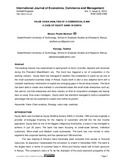| dc.contributor.author | Muturi, P. M. | |
| dc.contributor.author | Karanja, Tabitha W. | |
| dc.date.accessioned | 2021-08-17T09:06:23Z | |
| dc.date.available | 2021-08-17T09:06:23Z | |
| dc.date.issued | 2014 | |
| dc.identifier.citation | International Journal of Economics, Commerce and Management United Kingdom Vol. II, Issue 6, 2014 Licensed under Creative Common Page 1 http://ijecm.co.uk/ ISSN 2348 0386 | en_US |
| dc.identifier.issn | 2348 0386 | |
| dc.identifier.uri | https://www.semanticscholar.org/paper/VALUE-CHAIN-ANALYSIS-OF-A-COMMERCIAL-BANK-A-CASE-OF-Muthoni-Karanja/c6c4eb2146ad8bdbe6ea94af47082109023624ad | |
| dc.identifier.uri | https://1library.net/document/y9dl81wq-value-chain-analysis-commercial-bank-case-equity-kenya.html | |
| dc.identifier.uri | http://hdl.handle.net/123456789/4805 | |
| dc.description.abstract | The banking industry has experienced a rapid growth in terms of profits, deposits and revenues during the President Mwai Kibaki’s era. This trend has triggered a lot of competition in the banking industry. Equity bank has managed to weather this competition to stand out as one of the most successful business today in Kenya. Equity bank is also a very adaptive bank with a versatile reactionary mechanism to exploit any emerging gaps in the banking industry. The bank has been able to create new markets in uncontested areas like small scale enterprises such as; hair salons, Jua Kali enterprises and dairy industry so that its competition strategies are heavily bent on using ‘blue ocean strategies’. Equity bank has therefore managed to build a competitive advantage that can be exploited to sustain and further its growth. | en_US |
| dc.language.iso | en | en_US |
| dc.subject | Value Chain analysis, Strategy, value map, roadmap | en_US |
| dc.title | Value Chain Analysis of a Commercial Bank A Case of Equity Bank in Kenya | en_US |
| dc.type | Article | en_US |

